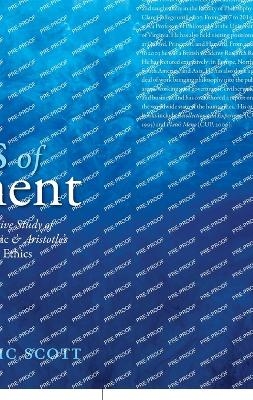
Levels of Argument
A Comparative Study of Plato's Republic and Aristotle's Nicomachean Ethics
Seiten
2015
Oxford University Press (Verlag)
978-0-19-924964-0 (ISBN)
Oxford University Press (Verlag)
978-0-19-924964-0 (ISBN)
Dominic Scott compares the Republic and Nicomachean Ethics from a methodological perspective. He argues that Plato and Aristotle distinguish similar levels of argument in the defence of justice, and that they both follow the same approach: Plato because he thinks it will suffice, Aristotle because he thinks there is no need to go beyond it.
In Levels of Argument, Dominic Scott compares the Republic and Nicomachean Ethics from a methodological perspective. In the first half he argues that the Republic distinguishes between two levels of argument in the defence of justice, the 'longer' and 'shorter' routes. The longer is the ideal and aims at maximum precision, requiring knowledge of the Forms and a definition of the Good. The shorter route is less precise, employing hypotheses, analogies and empirical observation. This is the route that Socrates actually follows in the Republic, because it is appropriate to the level of his audience and can stand on its own feet as a plausible defence of justice. In the second half of the book, Scott turns to the Nicomachean Ethics. Scott argues that, even though Aristotle rejects a universal Form of the Good, he implicitly recognises the existence of longer and shorter routes, analogous to those distinguished in the Republic. The longer route would require a comprehensive theoretical worldview, incorporating elements from Aristotle's metaphysics, physics, psychology, and biology. But Aristotle steers his audience away from such an approach as being a distraction from the essentially practical goals of political science. Unnecessary for good decision-making, it is not even an ideal. In sum, Platonic and Aristotelian methodologies both converge and diverge. Both distinguish analogously similar levels of argument, and it is the shorter route that both philosophers actually follow--Plato because he thinks it will have to suffice, Aristotle because he thinks that there is no need to go beyond it.
In Levels of Argument, Dominic Scott compares the Republic and Nicomachean Ethics from a methodological perspective. In the first half he argues that the Republic distinguishes between two levels of argument in the defence of justice, the 'longer' and 'shorter' routes. The longer is the ideal and aims at maximum precision, requiring knowledge of the Forms and a definition of the Good. The shorter route is less precise, employing hypotheses, analogies and empirical observation. This is the route that Socrates actually follows in the Republic, because it is appropriate to the level of his audience and can stand on its own feet as a plausible defence of justice. In the second half of the book, Scott turns to the Nicomachean Ethics. Scott argues that, even though Aristotle rejects a universal Form of the Good, he implicitly recognises the existence of longer and shorter routes, analogous to those distinguished in the Republic. The longer route would require a comprehensive theoretical worldview, incorporating elements from Aristotle's metaphysics, physics, psychology, and biology. But Aristotle steers his audience away from such an approach as being a distraction from the essentially practical goals of political science. Unnecessary for good decision-making, it is not even an ideal. In sum, Platonic and Aristotelian methodologies both converge and diverge. Both distinguish analogously similar levels of argument, and it is the shorter route that both philosophers actually follow--Plato because he thinks it will have to suffice, Aristotle because he thinks that there is no need to go beyond it.
Dominic Scott was awarded a PhD in Classics from the University of Cambridge in 1988 and taught there in the Faculty of Philosophy and Clare College until 2007. Since then has been at the University of Virginia, and has now returned to the UK, teaching ethics and politics at the University of Kent. He has also held visiting positions at Oxford, Princeton and Harvard. From 2001 to 2003 he was a British Academy Research Reader. He has lectured extensively: in Europe, North and South America, and Asia. He has also done a great deal of work bringing philosophy into the public arena, working with government, civil service and business, and has co-authored a report on the worldwide state of the humanities.
PART ONE; PART TWO
| Verlagsort | Oxford |
|---|---|
| Sprache | englisch |
| Maße | 147 x 222 mm |
| Gewicht | 436 g |
| Themenwelt | Geisteswissenschaften ► Philosophie ► Ethik |
| Geisteswissenschaften ► Philosophie ► Geschichte der Philosophie | |
| Geisteswissenschaften ► Philosophie ► Philosophie Altertum / Antike | |
| ISBN-10 | 0-19-924964-4 / 0199249644 |
| ISBN-13 | 978-0-19-924964-0 / 9780199249640 |
| Zustand | Neuware |
| Haben Sie eine Frage zum Produkt? |
Mehr entdecken
aus dem Bereich
aus dem Bereich


